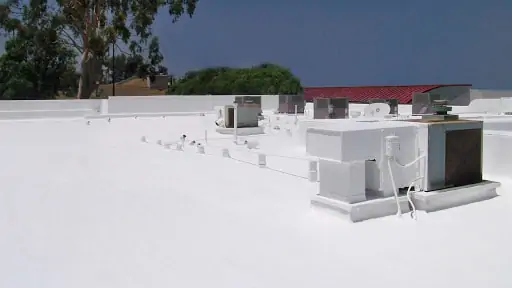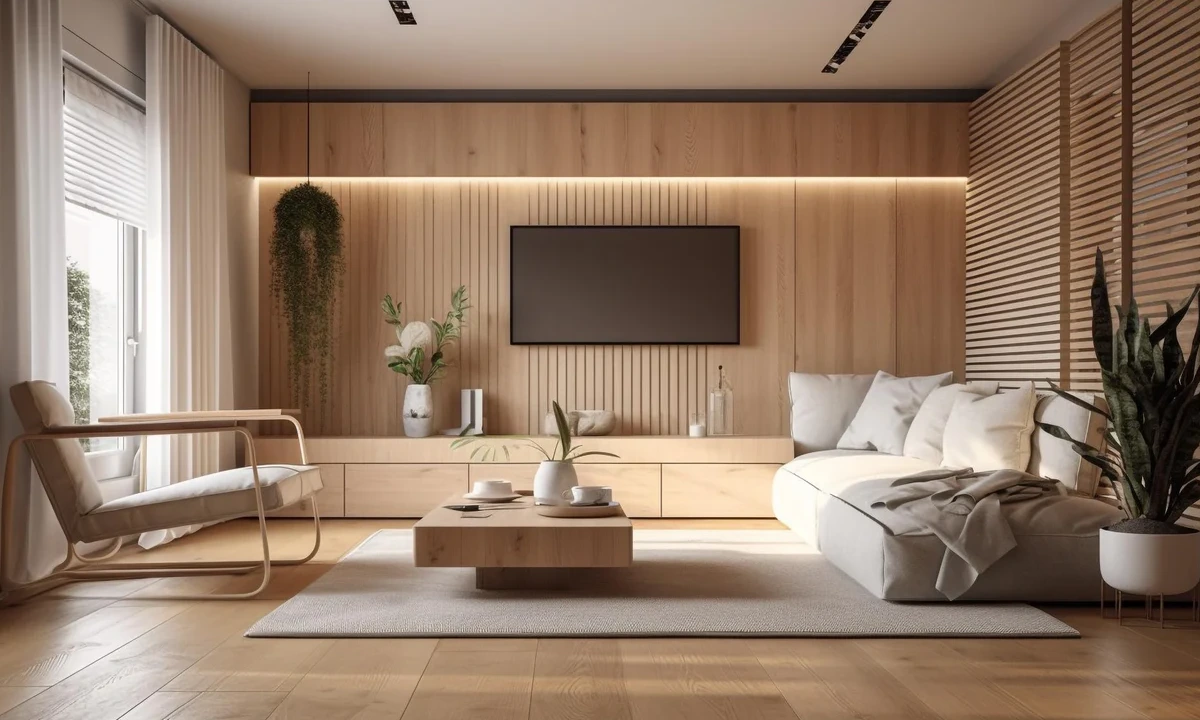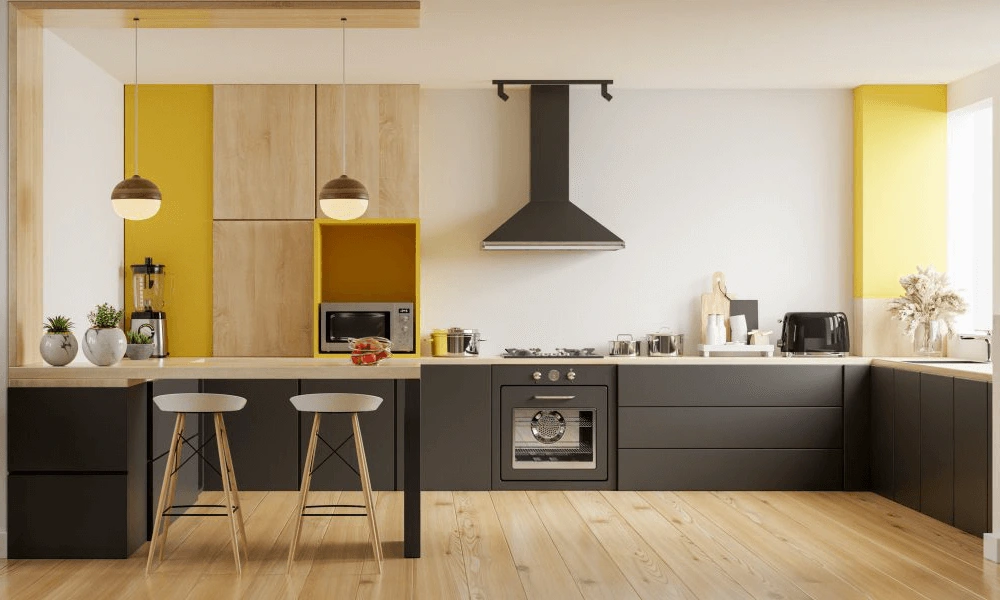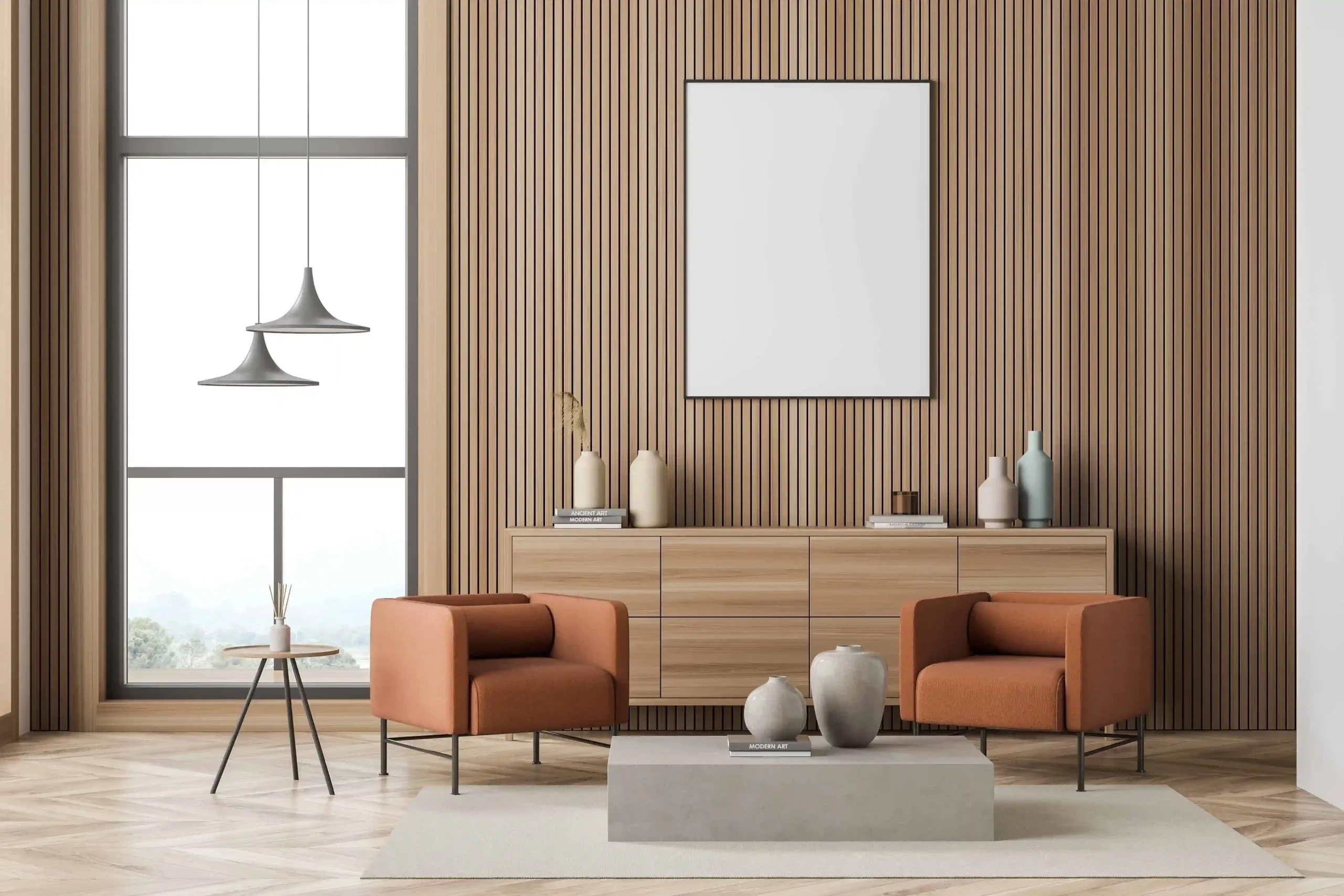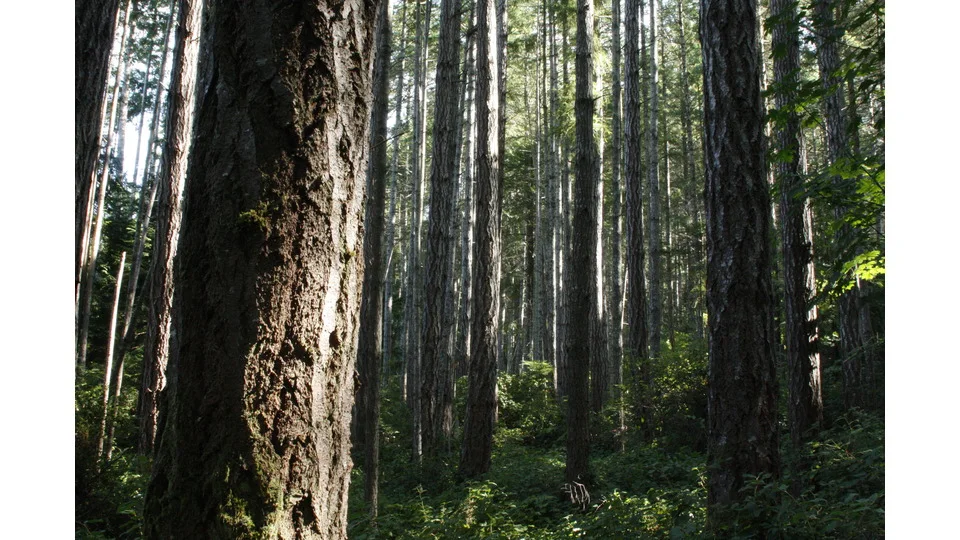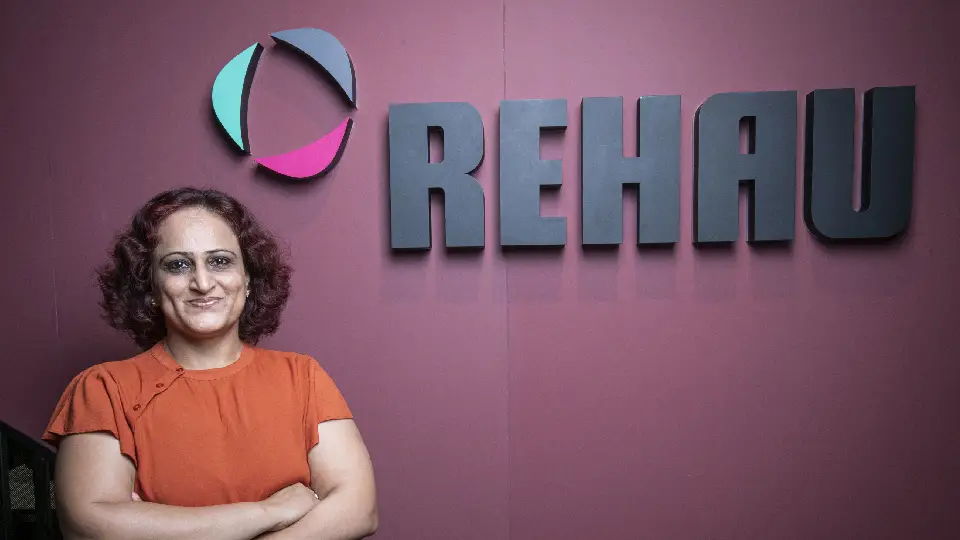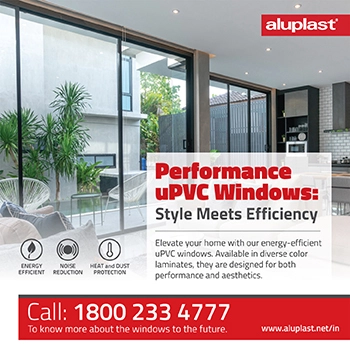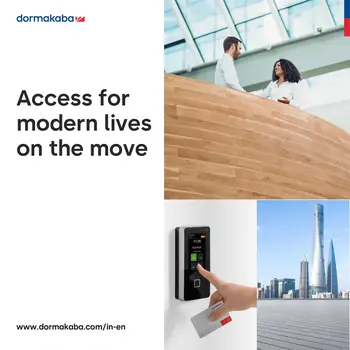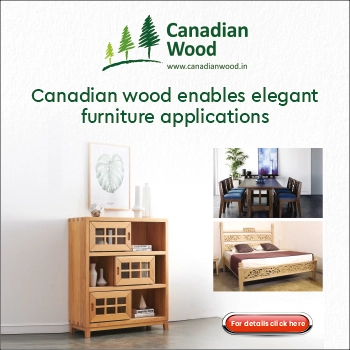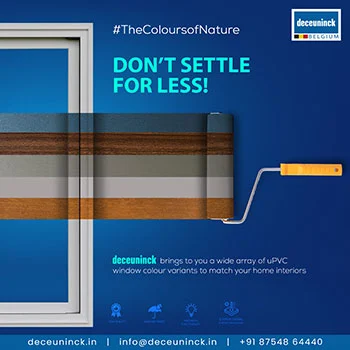Roofing sheets are essential in any building operation because they offer protection against external elements while ensuring structural integrity. Various types of roofing sheets are available at an affordable price, including corrugated iron sheets, plastic (uPVC) sheets, etc. The materials for manufacturing roofing sheets are based on architectural styles, climates, designs and budgets. Therefore, roofing sheets manufactured from durable materials such as plastic(uPVC), metal, fibre-cement, etc., help protect people, possessions, and the building itself from the rigours of harsh weather, rain, the searing heat of the sun, and gale-force winds. As the first barrier or the first line of defence, roofing sheets protect the building against outside environmental factors and help to keep safety, security, and comfort indoors.
Contents
- 1 Comparison of roofing sheet types: Usage, durability, cost, and more
- 2 Types of roofing sheets and their application
- 2.1 Based on material
- 2.1.1 Metal roofing sheets
- 2.1.2 Plastic roofing sheets
- 2.1.3 Aluminium roofing sheets
- 2.1.4 Galvanised steel roofing sheets
- 2.1.5 Asbestos cement roofing sheets
- 2.1.6 Polycarbonate roofing sheets
- 2.1.7 Polyurethane roofing sheets
- 2.1.8 Fibre-reinforced cement roofing sheets
- 2.1.9 Bamboo roofing sheets
- 2.1.10 Bio-composite roofing sheets
- 2.1.11 Bitumen roofing sheets
- 2.1.12 Rubber roofing sheets
- 2.1.13 Acrylic roofing sheets
- 2.1.14 Asphalt roofing sheets
- 2.1.15 Slate roofing sheets
- 2.2 Based on the surface texture
- 2.1 Based on material
- 3 Factors to consider while choosing the right type of roofing sheet
- 4 Watch this video: Types of roof sheets for house (06 mins 30 sec)
- 5 FAQs
- 5.1 Which type of roofing sheet is best for areas prone to heavy rainfall?
- 5.2 What is the standard thickness of roofing sheets?
- 5.3 Which roofing sheet provides maximum weather resistance?
- 5.4 Which type of roofing sheet is best suited for extremely hot climates?
- 5.5 What are colour-coated roofing sheets?
- 5.6 Which type of roofing sheet can I use on my terrace?
- 6 Waterproofing of buildings: Material types & applications (+Prices)
Comparison of roofing sheet types: Usage, durability, cost, and more
| Type | Usage | Life expectancy | Installation | Weather-resistance | Fire-resistance | Sound-insulation | Price range |
| Metal | Residential, commercial, industrial | 10-20 years | Moderate to difficult | High | High | Medium | ₹40-150/sqft |
| Plastic | Greenhouses, sunrooms, patio covers | 10-15 years | Easy to moderate | Medium | Low | Low | ₹30-60/ sqft |
| Aluminium | Residential, commercial, industrial | 20-50 years | Moderate to difficult | High | High | Medium | ₹50-150/sqft |
| Galvanised Steel | Residential, commercial, industrial | 20-30 years | Moderate to difficult | High | High | Medium | ₹40-120/sqft |
| Asbestos | Industrial, commercial (not recommended due to health concerns) | 20-40 years | Difficult | High | High | Medium | ₹30-80 /sqft |
| Polycarbonate | Greenhouses, sunrooms, patio covers | 10-20 years | Easy to moderate | Medium | Low | Low | ₹40-180/sqft |
| Polyurethane | Industrial, commercial | 15-30 years | Moderate to difficult | High | High | High | ₹80-200/sqft |
| Fibre-reinforced | Residential, commercial, industrial | 30-50 years | Moderate to difficult | High | High | Medium | ₹50-150/sqft |
| Bamboo | Eco-friendly buildings, residential | 20-40 years | Moderate to difficult | Medium | Low | Low | ₹80-200/sqft |
| Bio-composite | Eco-friendly buildings, residential | 20-40 years | Moderate to difficult | High | High | Medium | ₹150-350/sqft |
| Bitumen | Flat roofs, industrial, commercial | 10-15 years | Moderate to difficult | Medium | Low | Low | ₹50-400/sqft |
| Rubber | Flat roofs, industrial, commercial | 20-50 years | Moderate to difficult | High | High | Medium | ₹100-250/sqft |
| Acrylic | Greenhouses, sunrooms, patio covers | 10-20 years | Easy to moderate | Medium | Low | Low | ₹120-280/sqft |
| Asphalt | Residential, commercial | 15-30 years | Moderate to difficult | High | High | Medium | ₹80-200/sqft |
| Slate | Residential, commercial, and historic buildings | 40-100 years | Difficult | High | High | High | ₹100-400/sqft |
Types of roofing sheets and their application
Based on material
Metal roofing sheets
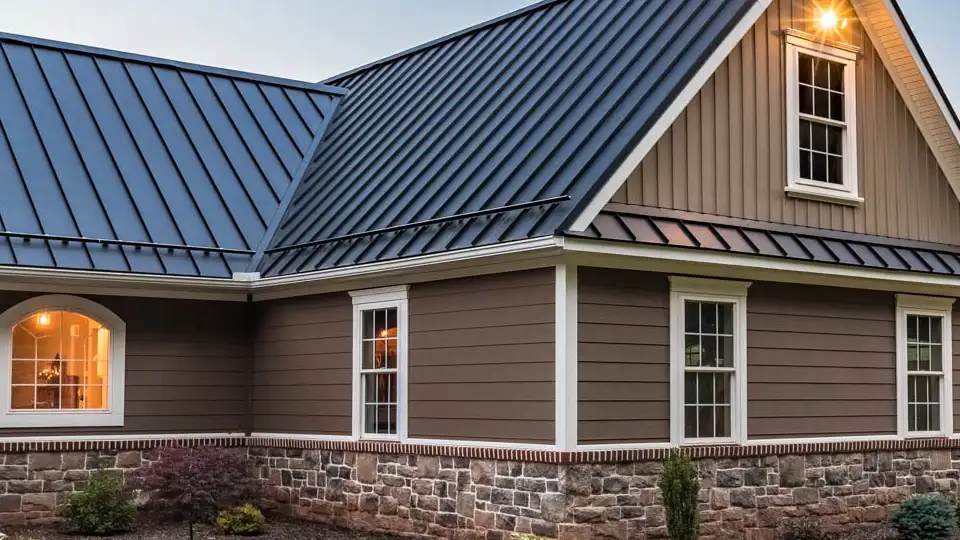
Image Source: Ludwigbuildingsenterprises.com
Metal roofing sheets are made from various metals, such as steel, aluminium, or copper. Additionally, they are well-known for their high strength and corrosion resistance.
Applications:
- Residential buildings
- Commercial buildings
- Industrial buildings
Plastic roofing sheets
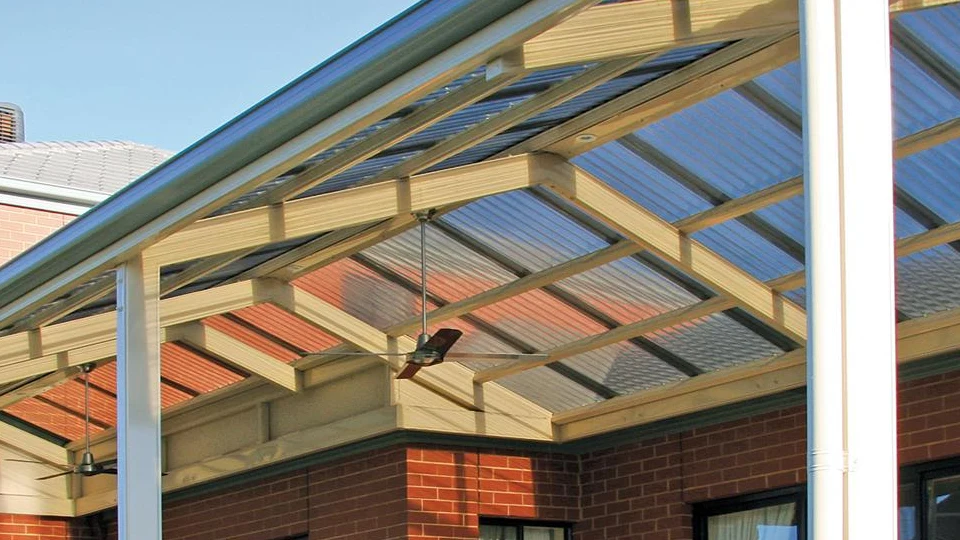
Image Source: Palramindustriesltd.com
Plastic roofing sheets are made from uPVC or other materials and are available at a budget-friendly price. They are widely used in sea areas as they provide building waterproofing. In addition, plastic roofing sheets are easy to install and are corrosion-resistant. They allow partial visibility and light to pass through them. Although available at a low price, plastic (uPVC) roofing sheets have less life expectancy than other building materials.
Applications:
- Greenhouses
- Sunrooms
- Patio covers
- Industrial buildings
Aluminium roofing sheets
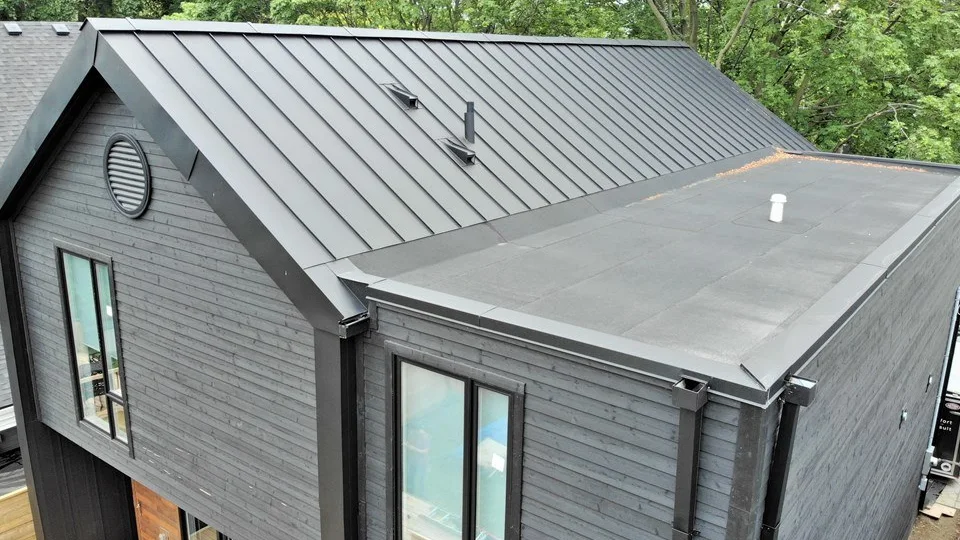
Image Source: Resilientroofingneworleeans.com
The lightweight aluminium roofing sheets are corrosion-resistant and durable. They are also resistant to fire and adverse weather conditions and are energy efficient. Moreover, these sheets have a high scrap value.
Applications:
- Residential buildings
- Commercial buildings
- Industrial buildings
Galvanised steel roofing sheets
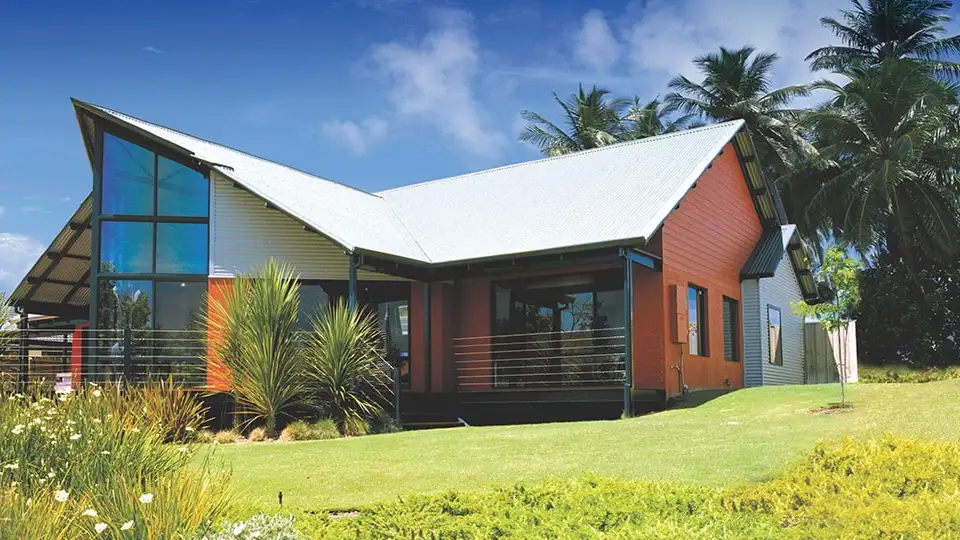
Image Source: Freepik.com
Galvanised Steel roofing sheets provide protection against corrosion owing to the application of zinc. They are fire-resistant and weather-proof. In addition, galvanised steel roofing sheets are economical and are preferred by architects.
Applications:
- Residential buildings
- Commercial buildings
- Industrial buildings
Asbestos cement roofing sheets
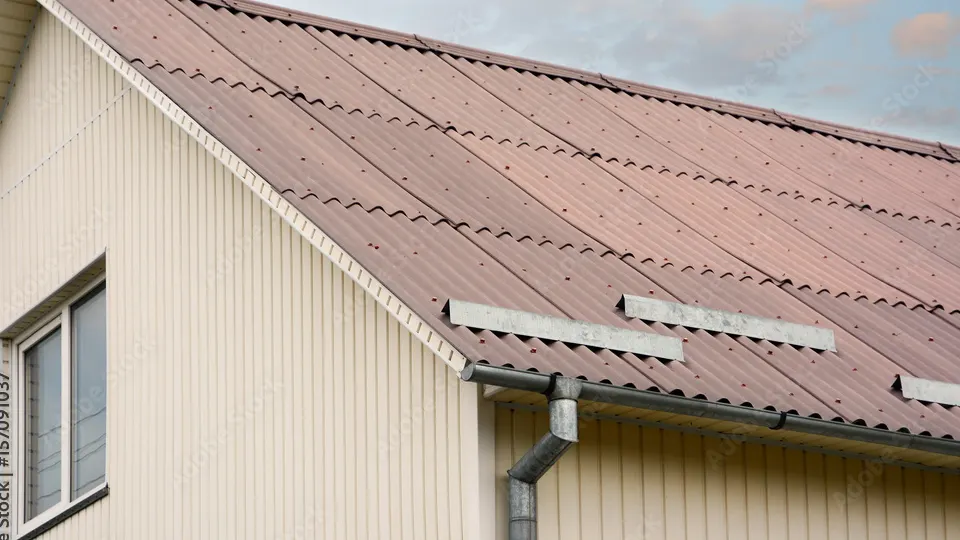
Image Source: Vecteezy.com
Asbestos cement roofing sheets are made up of a mixture of asbestos, cement, and water. They are fire-resistant and durable. Though affordable, their usage for roofing is generally discouraged due to their association with cancer-causing agents.
Applications:
- Industrial buildings
- Commercial buildings
- Residential buildings
Polycarbonate roofing sheets
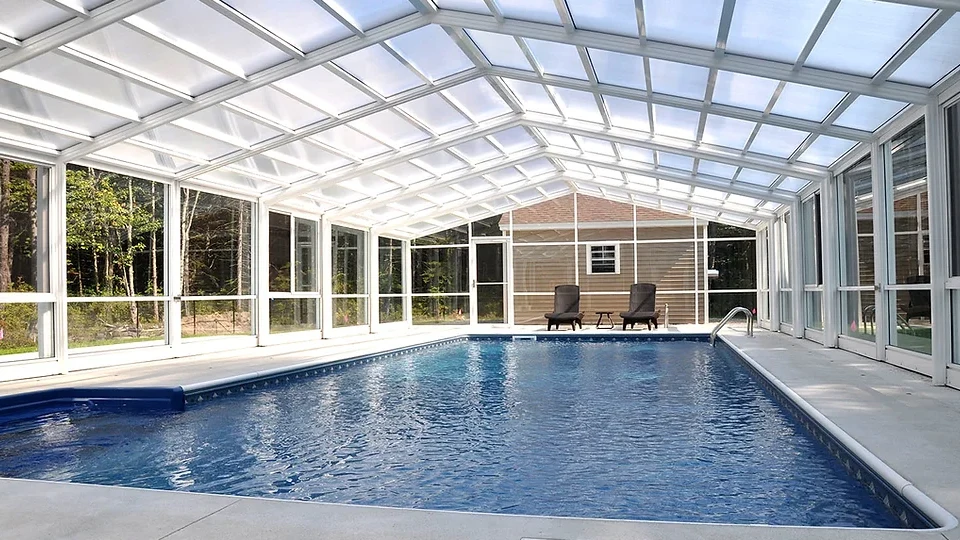
Image Source: Rollacover.com
Made from lightweight, impact-resistant plastic or uPVC, this type of polycarbonate roofing sheets allow natural light to pass through them and are affordable due to their price. Moreover, due to their neat design, roofing sheets are easy to install and are widely used in public places like bus stands, stadiums, and railway stations.
Applications:
- Greenhouses
- Sunrooms
- Patio covers
- Industrial buildings
Polyurethane roofing sheets
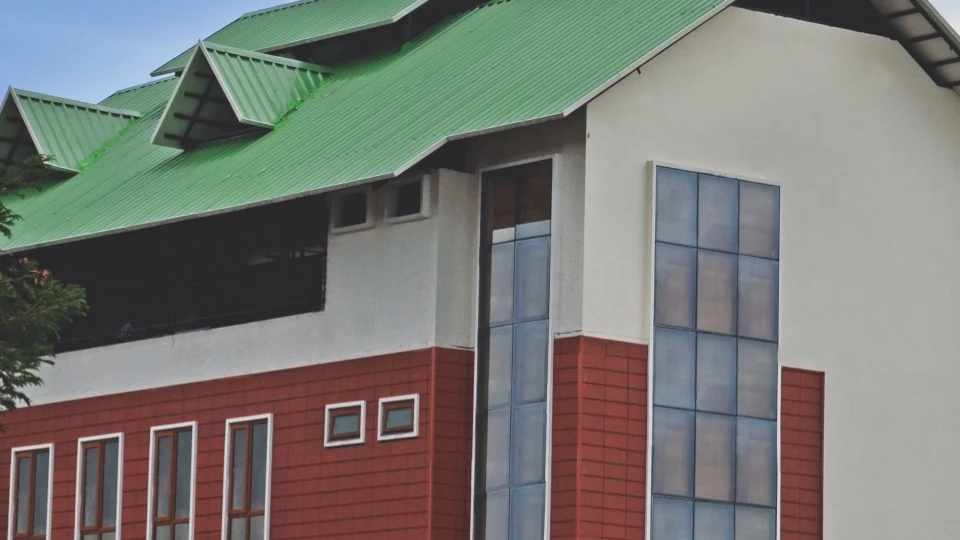
Image Source: Rinac.com
Polyurethane roofing sheets are a perfect insulation system backed up by economy. In addition, these types of roofing sheets are lightweight, energy-efficient, and easy to install.
Applications:
- Industrial buildings
- Commercial buildings
- Residential buildings
Fibre-reinforced cement roofing sheets
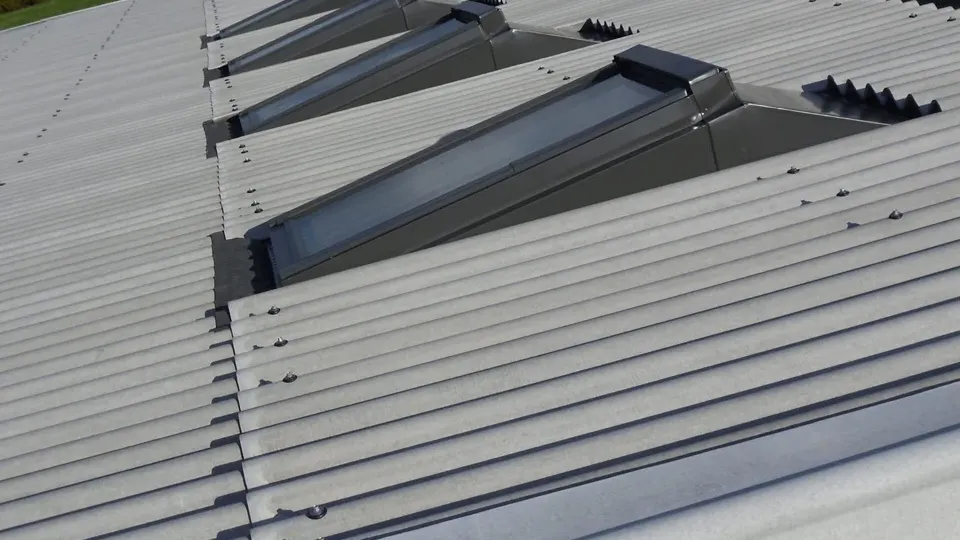
Image Source: Freepik.com
Fibre-reinforced cement roofing sheets are made of cement, sand, and natural fibres. Also, they are weather and corrosion-resistant.
Applications:
- Industrial buildings
- Commercial buildings
- Residential buildings
Bamboo roofing sheets
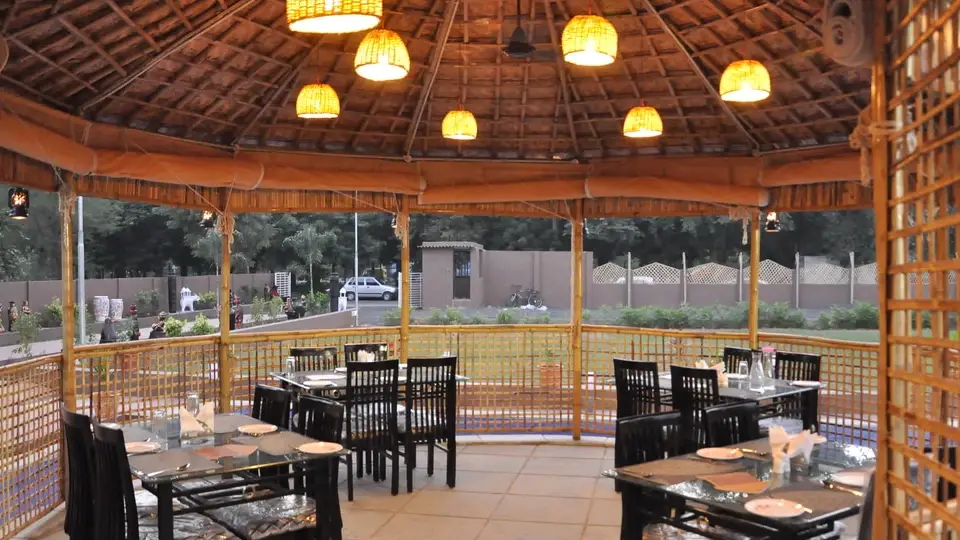
Image Source: Thechickhouse.co.in
Bamboo roofing sheets are made from sustainable, eco-friendly bamboo. In addition, they offer sustainability and are aesthetically pleasing.
Applications:
- Eco-friendly buildings
- Residential buildings
- Commercial buildings
Bio-composite roofing sheets
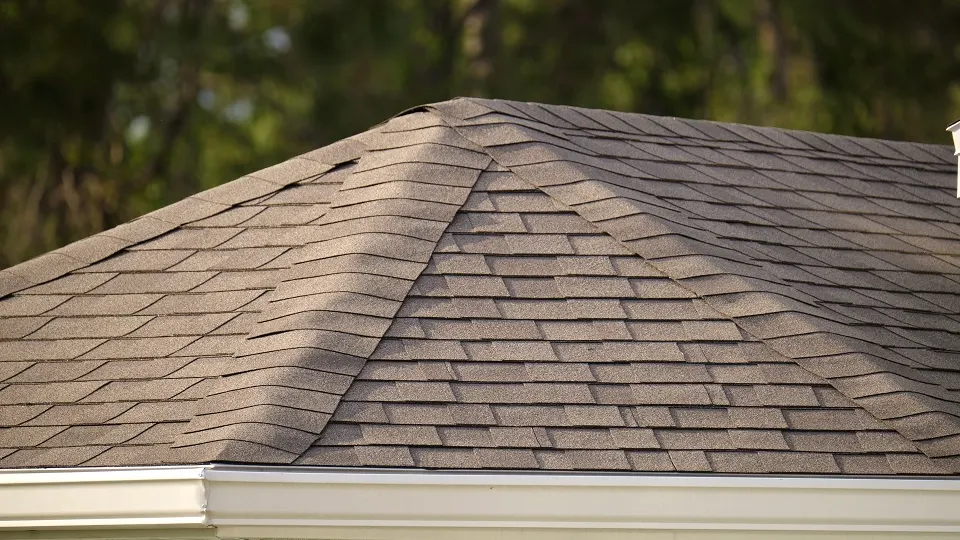
Image Source: Freepik.com
Bio-composite roofing sheets offer an interesting experience of sustainability, durability, and aesthetic beauty that makes them very attractive to environmentally conscious builders and homeowners.
Applications:
- Eco-friendly buildings
- Sustainable construction projects
- Green buildings
- Residential buildings with environmental concerns
- Commercial buildings seeking LEED certification
- Buildings located in sensitive ecosystems or natural reserves
Bitumen roofing sheets
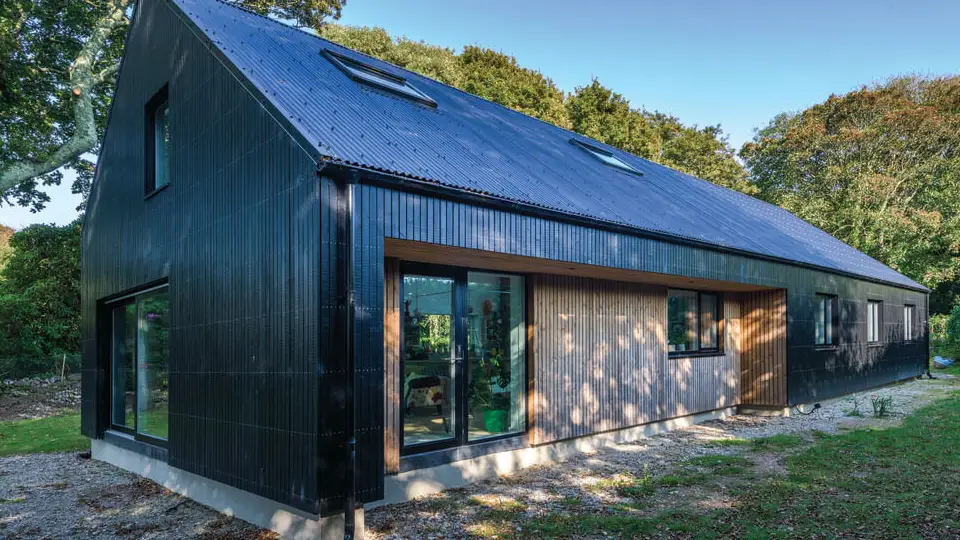
Image Source: Cladco.co.uk
Onduline sheets, also called bitumen roofing sheets, are made from a mixture of bitumen, sand, and other materials. They are weather and corrosion resistant. Moreover, they are environmentally friendly.
Applications:
- Flat roofs
- Industrial buildings
- Commercial buildings
Rubber roofing sheets
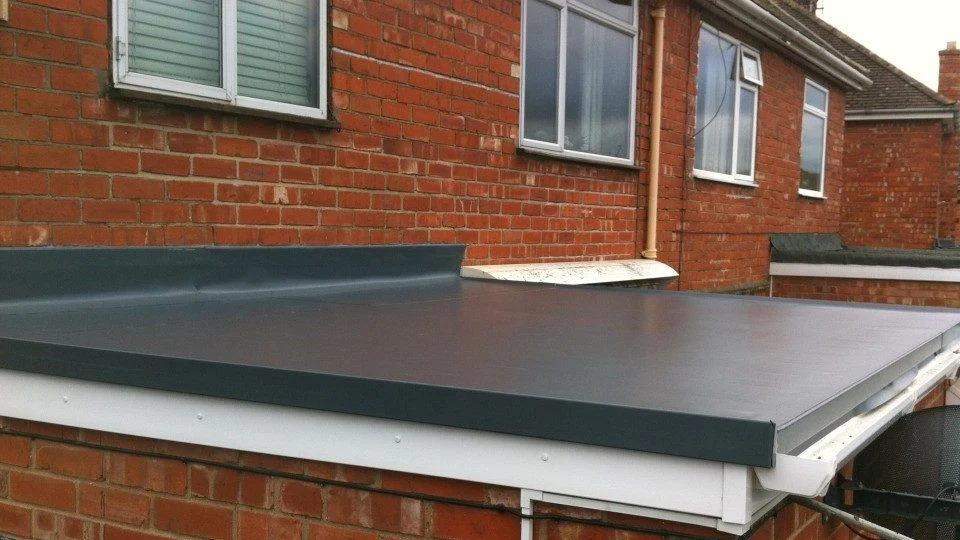
Image Source: Freepik.com
Rubber roofing sheets are waterproof, flexible sheets. In addition, they offer environmental and corrosion resistance.
Applications:
- Flat roof
- Industrial building
- Commercial building
Acrylic roofing sheets
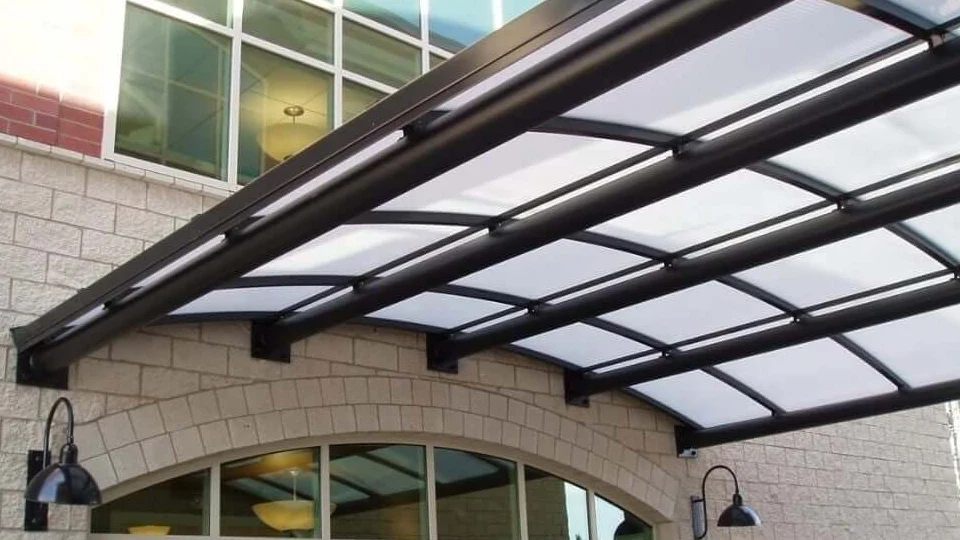
Image Source: Pinterest.com
Acrylic sheets for roofing purposes are made of lightweight, impact-resistant plastic or uPVC and are available at an affordable price. This type of roofing sheet offers easy installation and is durable. In addition, acrylic roofing sheets are translucent and allow light to pass through them.
Applications:
- Greenhouses
- Sunrooms
- Patio covers
- Industrial buildings
Asphalt roofing sheets
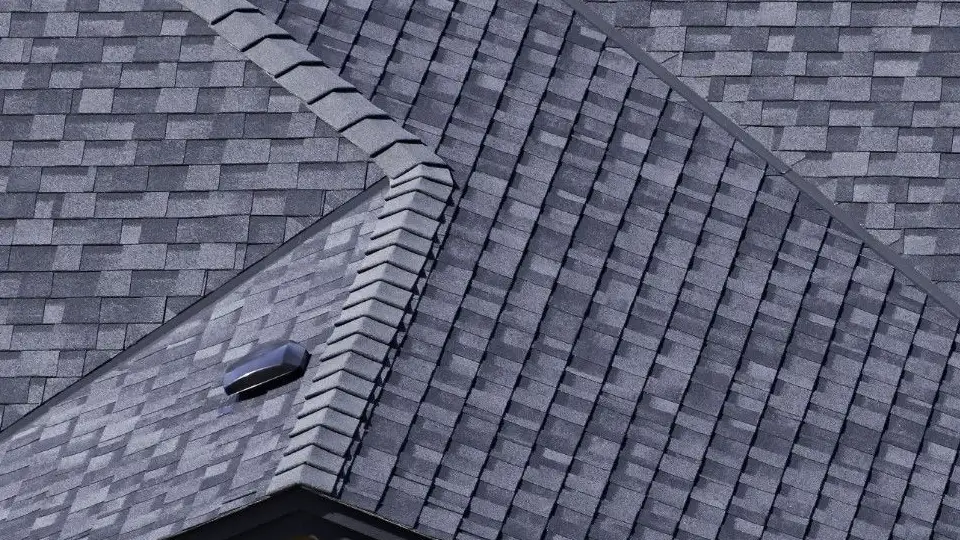
Image Source: Pinterest.com
Made from a mixture of asphalt, sand, and other materials, asphalt roofing sheets are water resistant and durable. In addition, they are quite affordable.
Applications:
- Flat roofs
- Industrial buildings
- Commercial buildings
Slate roofing sheets
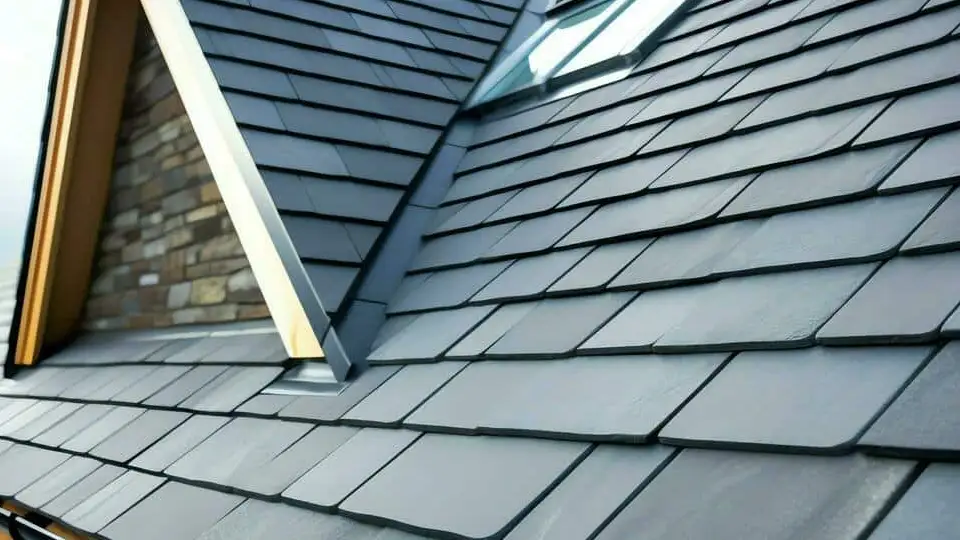
Image Source: Hammerheadroofingllc.com
Slate roofing sheets are made from good natural slate and durable equipment. Additionally, they offer corrosion resistance and good aesthetic beauty.
Applications:
- Residential buildings
- Commercial buildings
- Historic buildings
Based on the surface texture
Corrugated roofing sheets
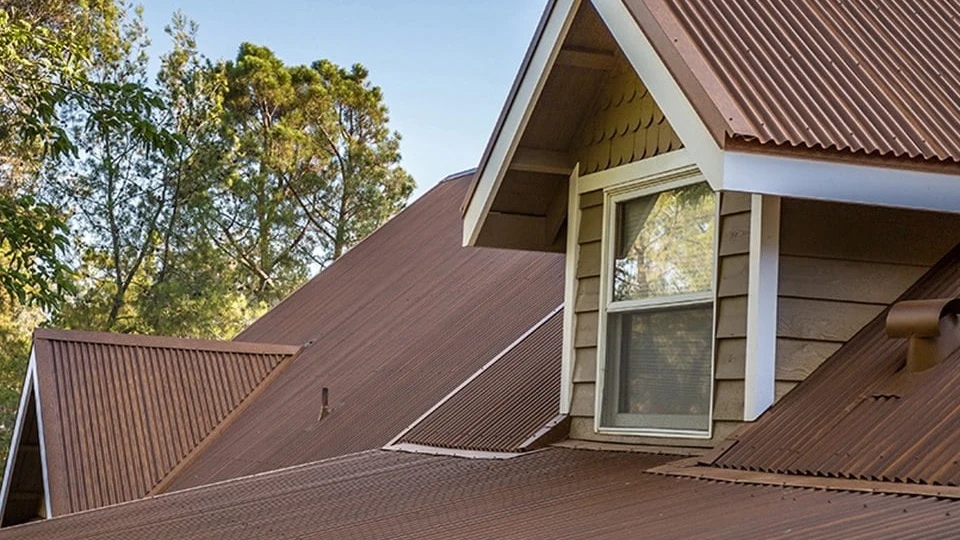
Image Source: Pinterest.com
The corrugated roofing sheets exhibit a wave-like, curved superficial texture. In addition, they are the most popular roofing sheets because of the following characteristics: high capability of water runoff, long-lasting, and extremely strong.
Applications:
- Residential buildings
- Commercial buildings
- Industrial buildings
- Agricultural buildings
Semi-corrugated roofing sheets
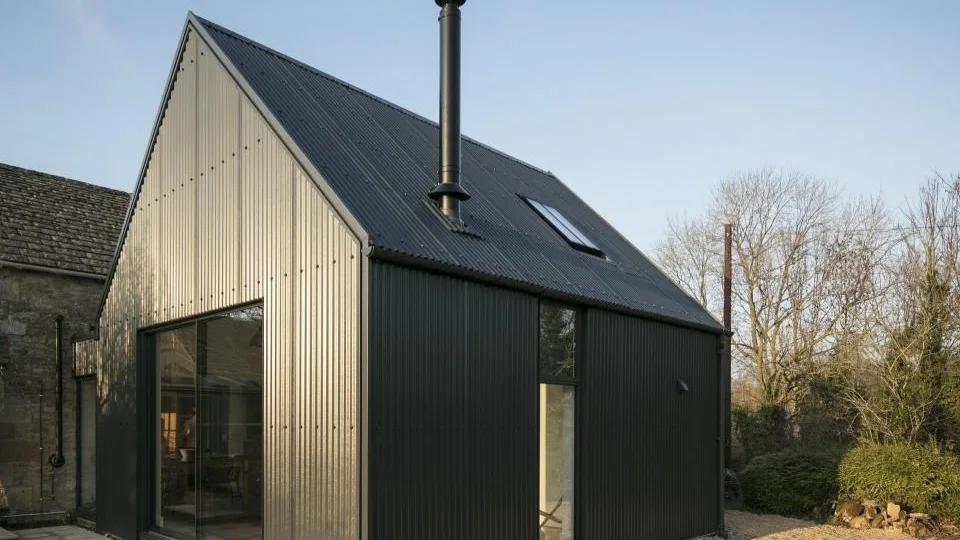
Image Source: Archello.com
A semi-corrugated roofing sheet has a surface texture which is a combination of corrugated and plain sheets. In addition, they provide improved runoff water compared to plain sheets, offering an aesthetic look and easy installation.
Applications:
- Residential buildings
- Commercial buildings
- Offices
- Schools
Plain roofing sheets

Image Source: Pinterest.com
Plain roofing sheets have a very smooth, flat surface. In addition, roofing sheets are generally easy to install, affordable, suitable for modern architectural designs, and can be used for wall cladding.
Applications:
- Modern residential buildings
- Commercial buildings
- Offices
- Warehouses
Factors to consider while choosing the right type of roofing sheet
Durability and longevity
Roofing sheets of all types made from strong materials protect the building against the effects of harsh natural elements, ensuring durability and longevity. Therefore, this factor should not be ignored while making a purchase.
Brand and quality
Choose trustworthy, well-established brands to guarantee the reliability and performance of roofing sheets at market price.
Climate and fire resistance
Choose the type of roofing sheets that will cause the least discomfort in harsh weather conditions and provide protection against fire, ensuring peace of mind.
Energy-efficient
Select sheets with a high solar reflectance index for minimum energy input costs.
Maintenance and costs
Maintenance, replacement, and repair costs play an important role in selecting roofing sheets. Moreover, plastic sheets made from materials like uPVC or PVC are one of the most cost-effective roofing sheets available at a minimal price.
Watch this video: Types of roof sheets for house (06 mins 30 sec)
In conclusion, like other construction materials, roofing sheets protect against harsh weather and provide an aesthetic look to the building. Given the many options available in terms of materials, designs, and benefits, selecting roofing sheets can prove to be a tough challenge. Therefore, with climate, financial considerations, and architectural designs in mind, one can select a suitable type of roofing sheet. Thus leading to a long-lasting, weather-tight, and durable roof while being satisfactory.
FAQs
Which type of roofing sheet is best for areas prone to heavy rainfall?
Galvanised iron or standing seam roofing sheets are a great choice for areas prone to heavy rainfall. With a waterproof cover, they are excellently designed to resist heavy rain and strong winds. A building that is dry, secure, and needs little maintenance is insured. Therefore, good quality roofing sheets are important for buildings in heavy rainfall areas.
What is the standard thickness of roofing sheets?
The standard thickness of roofing sheets normally depends on the material, ranging between 0.20 mm and 1.20 mm. In addition, the thickness can vary according to the user’s requirements. Moreover, CGI sheets are usually 0.20 mm to 0.80 mm, while colour-coated ones range from about 0.30 mm to 1.20 mm, thus ensuring durability and weather resistance.
Which roofing sheet provides maximum weather resistance?
Colour-coated roofing sheets have excellent weather resistance because the protective coating shields metal from corrosion and UV damage. Available in various colours and finishes, colour-coated roofing sheets are also becoming popular for residential and commercial buildings as they provide durability along with aesthetics.
Which type of roofing sheet is best suited for extremely hot climates?
Insulated roofing sheets, or cool-coated roofing sheets, are best for extremely hot climates. The special coating reflects solar radiation to reduce heat gain and helps maintain the building’s temperature. In addition, they provide energy efficiency and comfort and are ideal for desert or tropical regions.
What are colour-coated roofing sheets?
Colour-coated roofing sheets are made of galvanised iron or aluminium coated with a layer of colour. Offering excellent resistance to corrosion and UV protection, these roofing sheets are popular in residential and commercial construction for their durability, design, and low maintenance requirements. Additionally, these sheets have an average lifespan of 20- 25 years and are budget-friendly.
Which type of roofing sheet can I use on my terrace?
Waterproof EPDM (rubber) or PVC sheets are best for terrace use and are resistant to heavy rain and strong winds. Because of its ability to reflect UV rays and withstand extreme temperatures, it ensures a durable yet low-maintenance outdoor application, offering a dry and safe space. Hence, it is a popular choice among homeowners.
*The featured image used in this article is from pinterest.com
Waterproofing of buildings: Material types & applications (+Prices)
You’ve built a beautiful building using the best material. Even the interiors look exquisite and unique. But after a few mo










